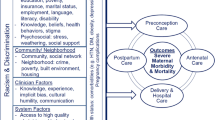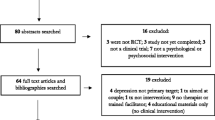Abstract
This study investigated perinatal depressive symptoms among HIV-infected women enrolled in a cluster-randomized, controlled trial in South Africa. Women (n = 1370) attending 12 community health centers were consecutively enrolled in a two-phase (phase 1 = without a male partner, phase 2 = with a male partner) and two-condition (experimental or control) prevention of mother-to-child transmission (PMTCT) intervention. Women were enrolled at 8–24 weeks pregnant and followed postpartum at 6 weeks and 6 and 12 months (retention rate = 69.8%). Antenatally, 45.4% of women were above the 12-point Edinburgh Postnatal Depression Scale (EPDS) cutoff, 30.2% were above the cutoff at 6 weeks, and 34.2% and 36.9% at 6 months and 12 months postpartum, respectively. In multilevel regression analyses, depressive symptoms decreased over time among women in phase 2 participating in the intervention condition, but neither condition nor phase alone was associated with a decrease in depression. Greater HIV stigma, increased psychological intimate partner violence, less male involvement, lower education, and non-adherence during pregnancy were associated with increased depressive symptoms over the perinatal period. Results indicated that women participating had high levels of depressive symptoms (> 40% prenatally and > 30% postnatally), and the combination of the multi-session PMTCT intervention plus male partner participation contributed to a reduction in depressive symptoms. Results suggest that interventions targeting the reduction of depressive symptoms in perinatal HIV-positive women by increasing male involvement and decreasing HIV stigma and intimate partner violence are needed to reduce depression in this vulnerable population.



Similar content being viewed by others
References
Bernard C, Dabis F, de Rekeneire N (2017) Prevalence and factors associated with depression in people living with HIV in sub-Saharan Africa: a systematic review and meta-analysis. PLoS One 12(8):e0181960. https://doi.org/10.1371/journal.pone.0181960
Blaney NT, Fernandez MI, Ethier KA, Wilson TE, Walter E, Koenig LJ, Perinatal Guidelines Evaluation Project Group (2004) Psychosocial and behavioral correlates of depression among HIV-infected pregnant women. AIDS Patient Care STDs 18(7):405–415. https://doi.org/10.1089/1087291041518201
Brittain K, Mellins CA, Phillips T, Zerbe A, Abrams EJ, Myer L, Remien RH (2017) Social support, stigma and antenatal depression among HIV-infected pregnant women in South Africa. AIDS Behav 21(1):274–282. https://doi.org/10.1007/s10461-016-1389-7
Byamugisha R, Tumwine JK, Semiyaga N, Tylleskar T (2010) Determinants of male involvement in the prevention of mother-to-child transmission of HIV programme in Eastern Uganda: a cross-sectional survey. Reprod Health 7:12. https://doi.org/10.1186/1742-4755-7-12
Chesney MA, Ickovics JR, Chambers DB, Gifford AL, Neidig J, Zwickl B, …. Patient Care Committee & Adherence Working Group of the Outcomes Committee of the Adult AIDS Clinical Trials Group (AACTG). (2000). Self-reported adherence to antiretroviral medications among participants in HIV clinical trials: the AACTG adherence instruments. AIDS Care 12(3), 255–266. https://doi.org/10.1080/09540120050042891
Cox JL, Holden JM, Sagovsky R (1987) Detection of postnatal depression. Development of the 10-item Edinburgh Postnatal Depression Scale. Br J Psychiatry 150:782–786
Cuca YP, Onono M, Bukusi E, Turan JM (2012) Factors associated with pregnant women's anticipations and experiences of HIV-related stigma in rural Kenya. AIDS Care 24(9):1173–1180. https://doi.org/10.1080/09540121.2012.699669
Fisher J, Cabral de Mello M, Patel V, Rahman A, Tran T, Holton S, Holmes W (2012). Prevalence and determinants of common perinatal mental disorders in women in low- and lower-middle-income countries: a systematic review. Bull World Health Organ. 90(2):139G–149G. https://doi.org/10.2471/BLT.11.091850
Gelaye B, Rondon MB, Araya R, Williams MA (2016) Epidemiology of maternal depression, risk factors, and child outcomes in low-income and middle-income countries. Lancet Psychiatry 3(10):973–982. https://doi.org/10.1016/S2215-0366(16)30284-X
Hu R, Li Y, Zhang Z, Yan W (2015) Antenatal depressive symptoms and the risk of preeclampsia or operative deliveries: a meta-analysis. PLoS One 10(3):e0119018. https://doi.org/10.1371/journal.pone.0119018
Ion A, Wagner AC, Greene S, Loutfy MR, Mothering Study Team HIV (2017) HIV-related stigma in pregnancy and early postpartum of mothers living with HIV in Ontario, Canada. AIDS Care 29(2):137–144. https://doi.org/10.1080/09540121.2016.1211608
Jones D, Peltzer K, Weiss SM, Sifunda S, Dwane N, Ramlagan S, … Spence A (2014). Implementing comprehensive prevention of mother-to-child transmission and HIV prevention for South African couples: study protocol for a randomized controlled trial. Trials 15, 417. https://doi.org/10.1186/1745-6215-15-417
Kalichman SC, Simbayi LC, Cloete A, Mthembu PP, Mkhonta RN, Ginindza T (2009) Measuring AIDS stigmas in people living with HIV/AIDS: the Internalized AIDS-Related Stigma Scale. AIDS Care 21(1):87–93. https://doi.org/10.1080/09540120802032627
Kharsany AB, Karim QA (2016) HIV infection and AIDS in sub-Saharan Africa: current status, challenges and opportunities. Open AIDS J 10:34–48. https://doi.org/10.2174/1874613601610010034
Lawrie TA, Hofmeyr GJ, de Jager M, Berk M (1998) Validation of the Edinburgh Postnatal Depression Scale on a cohort of South African women. S Afr Med J 88(10):1340–1344
Manongi R, Rogathi J, Sigalla G, Mushi D, Rasch V, Gammeltoft T, Meyrowitsch DW (2017) The association between intimate partner violence and signs of depression during pregnancy in Kilimanjaro region, northern Tanzania. J Interpers Violence 886260517724256:088626051772425. https://doi.org/10.1177/0886260517724256
Nachega JB, Uthman OA, Anderson J, Peltzer K, Wampold S, Cotton MF, … Mofenson LM (2012). Adherence to antiretroviral therapy during and after pregnancy in low-income, middle-income, and high-income countries: a systematic review and meta-analysis. Aids 26(16), 2039–2052. doi:https://doi.org/10.1097/QAD.0b013e328359590f
Peltzer K, Mlambo G (2010) Factors determining HIV viral testing of infants in the context of mother-to-child transmission. Acta Paediatr 99(4):590–596. https://doi.org/10.1111/j.1651-2227.2009.01670.x
Peltzer K, Shikwane ME (2011) Prevalence of postnatal depression and associated factors among HIV-positive women in primary care in Nkangala district. South Afr J HIV Med 12(4):24–28. https://doi.org/10.4102/sajhivmed.v12i4.168
Peltzer K, Weiss SM, Soni M, Lee TK, Rodriguez VJ, Cook R, … Jones D L (2017) A cluster randomized controlled trial of lay health worker support for prevention of mother to child transmission of HIV (PMTCT) in South Africa. AIDS Res Ther, 14(1), 61. https://doi.org/10.1186/s12981-017-0187-2
Peugh JL (2010) A practical guide to multilevel modeling. J Sch Psychol 48(1):85–112. https://doi.org/10.1016/j.jsp.2009.09.002
Quené H, van Den Bergh H (2004) On multi-level modeling of data from repeated measures designs: a tutorial. Speech Comm 43(1):103–121. https://doi.org/10.1016/j.specom.2004.02.004
Rodriguez VJ, LaCabe LP, Privette CK, Douglass KM, Peltzer K, Matseke G, … Jones DL (2017) The Achilles’ heel of prevention to mother-to-child transmission of HIV: protocol implementation, uptake, and sustainability. SAHARA J 14(1):38–52
Ross R, Sawatphanit W, Zeller R (2009) Depressive symptoms among HIV-positive pregnant women in Thailand. J Nurs Scholarsh 41(4):344–350. https://doi.org/10.1111/j.1547-5069.2009.01302.x
Ross R, Sawatphanit W, Mizuno M, Takeo K (2011) Depressive symptoms among HIV-positive postpartum women in Thailand. Arch Psychiatr Nurs 25(1):36–42. https://doi.org/10.1016/j.apnu.2010.05.003
Sowa NA, Cholera R, Pence BW, Gaynes BN (2015) Perinatal depression in HIV-infected African women: a systematic review. J Clin Psychiatry 76(10):1385–1396. https://doi.org/10.4088/JCP.14r09186
Straus M (1979) Measuring intrafamily conflict and violence: the conflict tactics (CT) scales. J Marriage Fam 41:75–88
Turan B, Stringer KL, Onono M, Bukusi EA, Weiser SD, Cohen CR, Turan JM (2014) Linkage to HIV care, postpartum depression, and HIV-related stigma in newly diagnosed pregnant women living with HIV in Kenya: a longitudinal observational study. BMC Pregnancy Childbirth 14:400. https://doi.org/10.1186/s12884-014-0400-4
Tuthill E, Pellowski JA, Young SL, Butler LM (2017) Perinatal depression among HIV-infected women in KwaZulu-Natal South Africa: prenatal depression predicts lower rates of exclusive breastfeeding. AIDS Behav 21(6):1691–1698
UNAIDS (2018) Fact sheet - Latest global and regional statistics on the status of the AIDS epidemic. Retrieved from http://www.unaids.org/sites/default/files/media_asset/UNAIDS_FactSheet_en.pdf
Visser MJ, Neufeld S, de Villiers A, Makin JD, Forsyth BW (2008) To tell or not to tell: South African women's disclosure of HIV status during pregnancy. AIDS Care 20(9):1138–1145. https://doi.org/10.1080/09540120701842779
Wickham H (2016) Ggplot2 : elegrant graphics for data analysis, second edn. Springer, Switzerland
Wong M, Myer L, Zerbe A, Phillips T, Petro G, Mellins CA, … Abrams EJ (2017). Depression, alcohol use, and stigma in younger versus older HIV-infected pregnant women initiating antiretroviral therapy in Cape Town, South Africa. Arch Womens Ment Health 20(1), 149–159. https://doi.org/10.1007/s00737-016-0688-3
Yator O, Mathai M, Vander Stoep A, Rao D, Kumar M (2016) Risk factors for postpartum depression in women living with HIV attending prevention of mother-to-child transmission clinic at Kenyatta National Hospital, Nairobi. AIDS Care 28(7):884–889. https://doi.org/10.1080/09540121.2016.1160026
Funding
This study was funded by a grant from the National Institute of Child Health and Human Development, R01HD078187, United States National Institutes of Health, and with the support from the Miami CFAR, NIH grant numberP30 AI073961.
Author information
Authors and Affiliations
Corresponding author
Ethics declarations
Prior to study onset, Institutional Review Board and Research Ethics Committee approval was obtained from the University of Miami Miller School of Medicine, the Human Sciences Research Council, and the Mpumalanga Provincial Government. All procedures performed were in accordance with the 1964 Helsinki declaration and its later amendments or comparable ethical standards. Informed consent was obtained prior to study procedures.
Conflict of interest
The authors declare that they have no conflicts of interest.
Additional information
Publisher’s note
Springer Nature remains neutral with regard to jurisdictional claims in published maps and institutional affiliations.
Rights and permissions
About this article
Cite this article
Peltzer, K., Abbamonte, J.M., Mandell, L.N. et al. The effect of male involvement and a prevention of mother-to-child transmission (PMTCT) intervention on depressive symptoms in perinatal HIV-infected rural South African women. Arch Womens Ment Health 23, 101–111 (2020). https://doi.org/10.1007/s00737-019-00955-7
Received:
Accepted:
Published:
Issue Date:
DOI: https://doi.org/10.1007/s00737-019-00955-7




